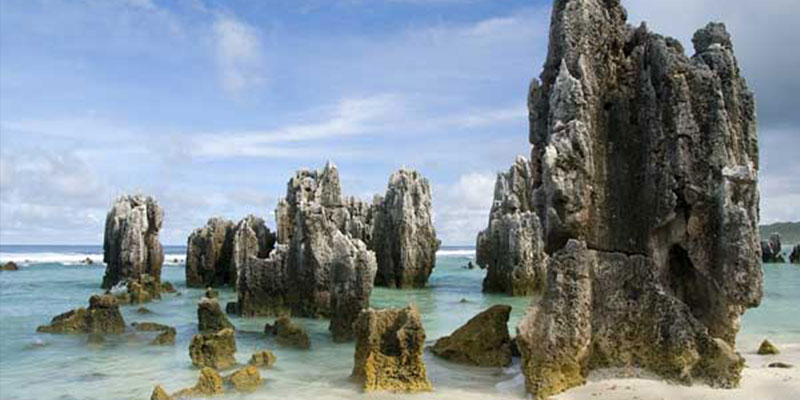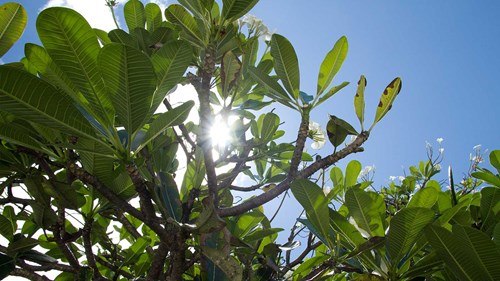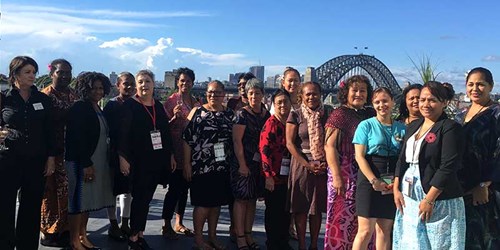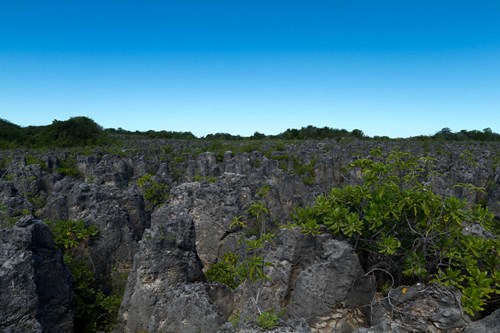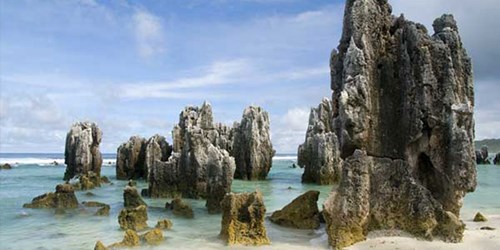|
|
Nauru (Naoero) is one of the world’s smallest independent states. Located 42 kilometres south of the equator, it has a land area of just 21 square kilometres.
A coral reef surrounds the entire island, which is dotted with pinnacles. The island is divided into 14 districts and its indigenous people belong to 12 tribes, represented by the twelve-pointed star on the national flag.
Nauru was under Australia’s administration until 1968, when it gained independence. On 31 January 2018, Nauru marked its 50th anniversary of independence, which was celebrated with a one-week holiday. Nauru enjoys a warm climate, with land temperatures ranging between 26–32 degrees Celsius and ocean temperatures at a constant 28–29 degrees Celsius all year round.
Economic Overview
Nauru’s economy faces constraints common to other small island states. Phosphate was the backbone of Nauru’s economy from 1970 until 2002, when the phosphate industry collapsed.
As phosphate sales started declining, the Nauru Fisheries and Marine Resources Authority used its revenue to sufficiently support the economy of Nauru, and continues to do so.
The economy was boosted by an Australian offshore refugee processing centre that was opened in 2001. The centre was closed in 2008 and reopened again in 2012.
The refugee processing centre became the backbone of Nauru’s economy, with a significant rise in the expatriate population that resulted in major increases in revenue from customs duties and other fees and levies.
Brief History
In 1798, British navigator Captain John Fearn sailed from New Zealand and passed Nauru on his way to the China Seas. He originally named Nauru ‘Pleasant Island’. Nauru was then annexed by Germany as part of the Marshall Islands Protectorate in 1888.
In 1900, Australian prospector Sir Albert Fuller Ellis noticed a rock from Nauru being used as a doorstop in a Sydney office and identified it as phosphate. He travelled to Nauru and confirmed the discovery. The first phosphate export sale from Nauru was in 1907.
After World War I, the population of Nauru plummeted to less than 1,500, which is the minimum number for a race to survive. The chiefs and the Australian administrator declared that the population should aim to reach 1,500. On 26 October 1932, the 1,500th Nauruan baby, a girl named Eidagaruwo was born. The day was called Angam Day, which became a national holiday, and the baby was known as the Angam baby.
Angam means jubilation, to have triumphed over all hardships or to have reached a set goal.
In 1947, Nauru came under Australian administration and became independent in 1968. Control of the British Phosphate Corporation was passed to the Nauru Phosphate Corporation in 1970.
Revenues received from phosphate sales were put into the Nauru Phosphate Royalties Trust. From that, Nauru achieved the second highest gross domestic product per capita and one of the highest standards of living in the Third World. The drop in the price of phosphate and financial mismanagements led to the collapse in the economy in the 1990s.
Nauru struggled financially until the establishment of an Australian Government refugee processing centre in 2001, which contributed to the improvement of the economy.
Culture
The Christian faith greatly influences Nauru culture. Nauru inhabitants live by the motto ‘God’s will first’, which shows the depth of the impact of Christianity in Nauruans’ lives.
Chosen grandchild
The chosen grandchild is decided by the grandparents and is usually the first or last-born grandchild. The child will be taken in and raised by the grandparents. The child will receive the same share of the grandparents’ inheritance as his or her parents.
Kirida (awakening)
Nauruans have a traditional pre-birthday celebration called Kirida. The celebration starts at 12.00 am. Family and friends go to the birthday person’s house as a group, bearing gifts, a cake and a birthday outfit, which can be a traditional costume or a modernised version of the costume, to sing the traditional Kirida song outside the house. The family of the birthday person who live in the same house welcome the group by powdering the visitors’ necks and faces, and spraying perfume on them while the group is singing.
The group will continue singing until the birthday person comes outside the house to receive them. The group will then dress the birthday person in their birthday outfit and proceed with Western birthday customs such as conveying birthday wishes, blowing out candles on a cake and singing ‘Happy birthday’. The group will then leave so that the family can prepare for the birthday celebration later that night.
Pwapwa
Nauruans have a tradition called pwapwa where a person shares the joy of a big achievement. Family and friends come to congratulate the person for his or her achievement and in return, the guests can take anything from the person’s house.
Out of pride and joy, the person and the family living in the same house may give everything they own to the people who come to congratulate the person’s achievement.
There are two achievements where this kind of pabwa usually occurs: one is winning the government high school scholarship scheme and the other is winning in a government election.
Pabwa may also occur for other achievements such as having a first child, 21st or 50th birthday celebrations and other significant events, but to a lesser degree.
Games and songs
Traditional games include itsibweb, ekaraduga, itsibwebwe, ekeniw egaro, and iruwo (chants); however, most of these are not as popular today. A traditional game that is still very popular is wrestling.
The Nauru government tries to keep these games alive by hosting competitions during national days such as Angam Day. The government also encourages traditional songs during national celebrations.
Politics
Nauru is one of the world’s smallest independent states. Gaining independence in 1968, Nauru has a democratic, Westminster-style parliamentary system of government.
The president is elected by, and responsible to, the unicameral parliament and is both head of government and head of state.
There are no political parties in Nauru; all members of parliament stand as independents.
There are 14 districts in Nauru and eight constituencies. From the eight constituencies, 19 are elected to be members of parliament.
Elected members of parliament have a term of three years. The current head of the state is President Baron Divavesi Waqa.
The first female elected as a member of parliament was Ruby Thoma. In 2013, Hon. Charmaine Scotty from the constituency of Yaren was the first woman to be elected as a member of parliament. In 2017, a by-election for the constituency of Ubenide resulted in the Hon. Gabrissa Hartman becoming the second woman elected as a member of the current parliament.
The two female members of parliament are taking positive steps towards the empowerment of women in Nauru.
--------------------
Published February 2018
Source
- Justin Togoran, Economic Sector Planner, Nauru Department of Finance Australian Department of Foreign Affairs and Trade
- Trade & Economic Factsheet
Image credit: South Pacific Tourism Organisation


